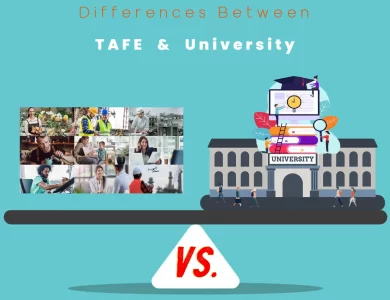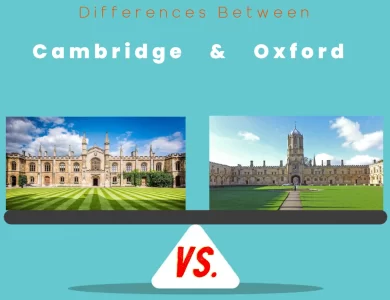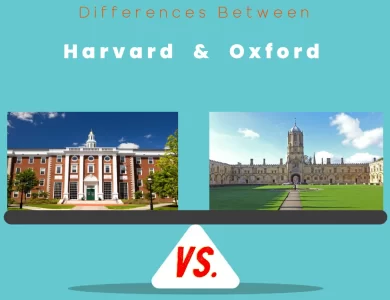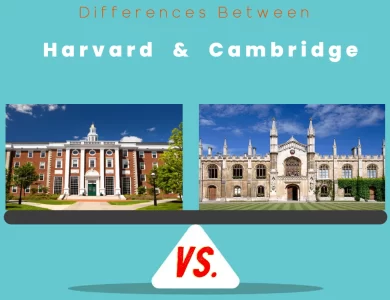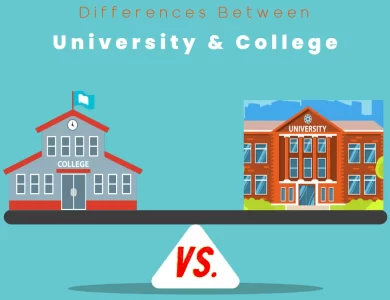Education
In this informative space, we aim to shed light on the various nuances and distinctions that exist within the realm of education. Whether you’re a student, educator, or simply curious about the intricacies of educational terminology, you’re in the right place.
Education is a vast field, encompassing a myriad of concepts, methodologies, and practices. It’s no wonder that there are often variations in terms, approaches, and other elements across different educational systems, countries, and even institutions. Our goal here is to help you navigate these differences and gain a deeper understanding of the diverse landscape of education worldwide.
To facilitate your exploration, we have organized our content into different sections, each focusing on a specific aspect of educational disparities. Let’s dive into the exciting topics we have in store for you!
-

Chemical Engineering vs Chemistry
When it comes to the world of molecules, compounds, and chemical reactions, Chemistry and Chemical Engineering stand out as two captivating yet distinct fields. While they share common roots in the realm of chemicals and elements, they diverge significantly in terms of focus, education, and career paths. Chemistry, often known as the "central science," delves into the study of matter, its properties, and the intricate dance of atoms and molecules. Chemists are the scientific explorers of this microscopic realm, seeking to understand the fundamental principles of chemistry. Their work often takes place in laboratories, where they conduct experiments, analyze substances, and uncover the secrets of chemical reactions. On the other hand, Chemical Engineering applies the principles of chemistry and engineering to design, optimize, and oversee large-scale processes for the production of chemicals, materials, and energy. Chemical engineers are the architects of industrial processes, ensuring that scientific discoveries are translated into practical applications that power various industries. Their work is often found on the plant floor, where they oversee the operation of chemical processes, troubleshoot issues, and maximize efficiency. In this comprehensive comparison, we will explore the educational pathways, career prospects, work environments, and problem-solving approaches that set these two fields apart. Whether you're a student contemplating your academic journey or a professional considering a career change, understanding the differences between Chemistry and Chemical Engineering is the first step toward choosing the path that aligns with your passion and goals.
-

University vs TAFE
Curious about the choices between TAFE and University? This guide unpacks the fundamental differences to help you make an informed decision. TAFE (Technical and Further Education) and University offer distinct pathways, each catering to unique learning styles and career aspirations. TAFE excels in providing practical, hands-on training for vocational fields, equipping students with industry-specific skills. The shorter duration of TAFE courses appeals to those aiming for swift workforce entry. On the other hand, University offers a comprehensive academic experience, delving into theoretical knowledge, research skills, and critical thinking. The longer duration of university degrees allows for in-depth exploration of subjects and broader skill development. Entry requirements vary between the two, with TAFE often having more flexible criteria compared to structured prerequisites in universities. Financial considerations come into play too, with TAFE typically offering more budget-friendly options. Whether you envision a hands-on approach or desire academic depth, understanding the nuances between TAFE and University is pivotal to embarking on the right educational journey for your future.
-

Biological Science vs Physical
Embarking on a journey of scientific inquiry, the differences between Physical and Biological Science emerge as two distinct yet interconnected realms. Physical Science delves into the fundamental laws governing non-living matter and energy. It unravels the universe's mysteries through physics, chemistry, and astronomy, crafting our understanding of forces, particles, and the cosmos' grand tapestry. On the other hand, Biological Science ventures into the vibrant domain of life, from microscopic cells to vast ecosystems. Genetics, ecology, and evolutionary studies illuminate the remarkable adaptations and biodiversity that characterize living organisms. While Physical Science employs quantitative analysis and mathematical models, Biological Science embraces both qualitative and quantitative approaches, underscoring the intricacies of life's myriad forms. These realms aren't isolated islands; they interplay in interdisciplinary fields, enriching our understanding of biomechanics, environmental sciences, and more. The choice between them hinges on passions and strengths, leading to careers shaping technology or impacting medicine and conservation. As you explore the captivating Differences Between Physical vs Biological Science, remember that each path uncovers the awe-inspiring wonders that shape our world and our place within it.
-

MBA vs MCA
Navigating the labyrinth of higher education often leads to the crossroads of MCA (Master of Computer Applications) and MBA (Master of Business Administration). These two acronyms represent distinct trajectories – MCA delves into the intricacies of technology and computer applications, while MBA equips you with the art of business administration and management. The choice between MCA and MBA holds the potential to shape your career compass, and understanding their nuances is paramount. MCA's curriculum is intertwined with programming languages, software engineering, data structures, and networking, sculpting tech-savvy professionals. On the flip side, MBA's canvas encompasses marketing, finance, strategic planning, and leadership, crafting business leaders. The career trajectories diverge – MCA graduates venture into software development, network management, and cybersecurity, while MBA graduates thrive in roles like marketing managers, financial analysts, and operations directors. The financial landscape varies too, with MCA professionals earning a median salary of $60,000 to $100,000, and MBA professionals securing $70,000 to $120,000, with the potential for lucrative leadership roles. As you stand at this juncture, your interests, strengths, and aspirations will guide your choice. Whether you're drawn to the rhythm of code or the orchestra of business strategies, the path you choose is a step toward an exciting and rewarding future.
-

Doctorate vs PhD
Are you standing at the crossroads of higher education, torn between pursuing a PhD or a Doctorate? This decision can shape your academic and professional journey in profound ways. A PhD, or Doctor of Philosophy, isn't limited to philosophy; it's a research-intensive program spanning diverse fields. It's about pushing boundaries, uncovering new knowledge, and becoming an expert in your chosen domain. On the other hand, the term "Doctorate" encompasses a spectrum of advanced degrees, from Doctor of Education (EdD) to Doctor of Business Administration (DBA), each tailored to specific industries and career paths. The main distinction lies in the focus: PhD emphasizes research and contributions to academia, while Doctorate degrees often prioritize practical application, leadership, and expertise in industries. If you envision shaping the future of your field through groundbreaking research, a PhD might be your calling. Alternatively, if you're drawn to making a tangible impact in industries and steering innovation, a Doctorate could be the perfect fit. This guide delves into the nuances, career prospects, and considerations of both paths, empowering you to embark on the educational journey that aligns with your aspirations.
-

Oxford vs Cambridge
Embarking on the journey of higher education brings you to a crossroads: Cambridge or Oxford? These two esteemed institutions, steeped in centuries of academic excellence, offer unique paths for your intellectual odyssey. Delve into the differences between Cambridge and Oxford, and discover the nuances that set them apart. Both universities emphasize rigorous academia, yet they employ distinct approaches. Cambridge leans towards specialization, allowing you to immerse yourself deeply in your chosen field through its tripos system. In contrast, Oxford offers flexibility, encouraging exploration across various subjects while maintaining a strong foundation in your major. The teaching styles at these universities also diverge—Cambridge's intense one-on-one tutorials versus Oxford's small-group discussions. Beyond academics, the campus atmospheres enchant with their own allure. Cambridge's idyllic charm and punting tradition contrast Oxford's vibrant blend of urban energy and rural beauty. As you consider your path, contemplate the application processes: Cambridge's subject-specific assessments versus Oxford's holistic evaluations. The choice is yours, and understanding these differences will illuminate the unique educational tapestries woven by Cambridge and Oxford.
-

Oxford vs Harvard
When it comes to selecting a world-class university, Harvard and Oxford stand tall, offering distinct educational experiences. Harvard University, nestled in Cambridge, Massachusetts, showcases a decentralized academic model with interdisciplinary research at its core. On the other side of the Atlantic, the University of Oxford, ensconced in the historic city of Oxford, England, follows a collegiate system with personalized tutorials that foster profound discussions and critical thinking. These institutions diverge not only in teaching methods but also in campus environments. Harvard thrives in an urban setting near Boston, providing access to industry connections and cultural events. Oxford, however, exudes a more classical ambiance, boasting centuries-old architecture and serene courtyards. This comparison extends to alumni networks; while Harvard's graduates span various industries, Oxford's alumni shine in academia, law, and politics. When pondering the decision between Harvard and Oxford, financial considerations come into play. Harvard's tuition fees are notable, but financial aid programs ensure accessibility. Oxford, too, offers scholarships and bursaries. With these factors in mind, prospective students can weigh the nuances and choose the university that aligns best with their educational aspirations and personal preferences.
-

Cambridge vs Harvard
Embarking on the journey to higher education, the choice between Harvard and Cambridge universities can be a pivotal moment. Rooted in rich histories and revered for their academic excellence, these institutions stand on either side of the Atlantic, each offering a unique tapestry of experiences. Harvard, nestled in the bustling city of Cambridge, Massachusetts, and Cambridge, situated in the historic charm of Cambridge, England, present distinct academic philosophies. Harvard embraces the liberal arts, encouraging students to explore diverse subjects before declaring a major. Meanwhile, Cambridge's specialized college system immerses students directly into their chosen disciplines. Teaching methodologies differ as well, with Harvard's interactive discussions contrasting Cambridge's lecture and supervision approach. Campus cultures reveal further nuances: Harvard's vibrant urban environment and diverse extracurriculars versus Cambridge's tradition-rich collegiate system. These institutions impact the global landscape through groundbreaking research and influential alumni networks. This guide delves into the heart of these differences, aiding aspirants in making an informed decision that aligns with their academic ambitions and personal values. Whether it's the historical legacy of Harvard or the timeless traditions of Cambridge, your choice will shape your intellectual journey and leave an indelible mark on your future.
-

Learning vs Maturation
In this enlightening article, we delve into the distinctions between maturation and learning. Explore the contrasting characteristics, mechanisms, and impacts of these processes as they shape our growth and development. From the predetermined nature of maturation to the adaptable nature of learning, uncover the fascinating interplay between nature and nurture. Join us on this captivating journey of understanding the disparities between maturation and learning, and how they shape our remarkable development.
-

University vs College
Are you feeling perplexed by the terms "university" and "college"? Do you find yourself wondering what sets them apart in the realm of higher education? Look no further! In this article, we unravel the distinctions between universities and colleges, shedding light on their academic programs, campus experiences, and more. Whether you're a student navigating the college application process or simply curious about the education landscape, join us on this enlightening journey as we explore the captivating differences between universities and colleges. Universities encompass a vast array of undergraduate and postgraduate programs across various disciplines. With an emphasis on research and innovation, universities often boast cutting-edge facilities and renowned faculty members who actively contribute to their fields. On the other hand, colleges typically specialize in undergraduate education, offering programs tailored to specific fields of study. These institutions often prioritize practical skills and career readiness, providing students with a more intimate and personalized learning environment. Beyond academic offerings, universities and colleges differ in campus size, faculty-student ratios, and the overall campus culture. Universities often feature sprawling campuses with diverse resources and extracurricular activities, fostering a vibrant and multicultural atmosphere. Meanwhile, colleges offer a tight-knit community where students benefit from smaller class sizes and closer interactions with professors. Join us on this educational voyage as we delve into the captivating realm of universities and colleges. Gain valuable insights to inform your educational journey and make an informed decision about your future.

